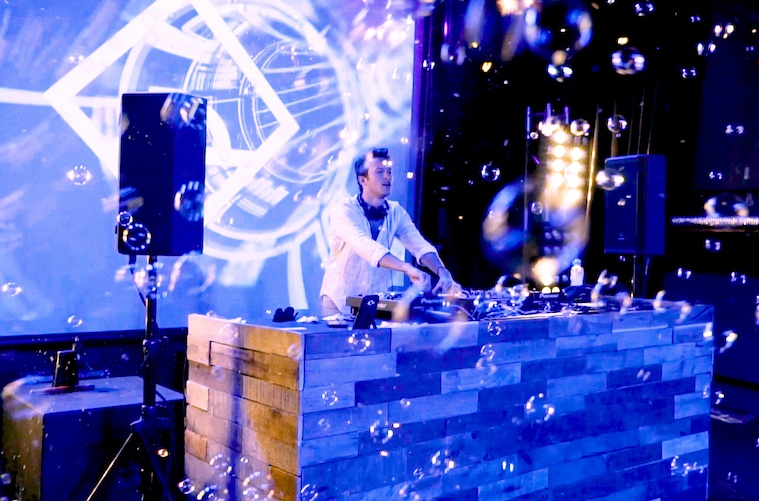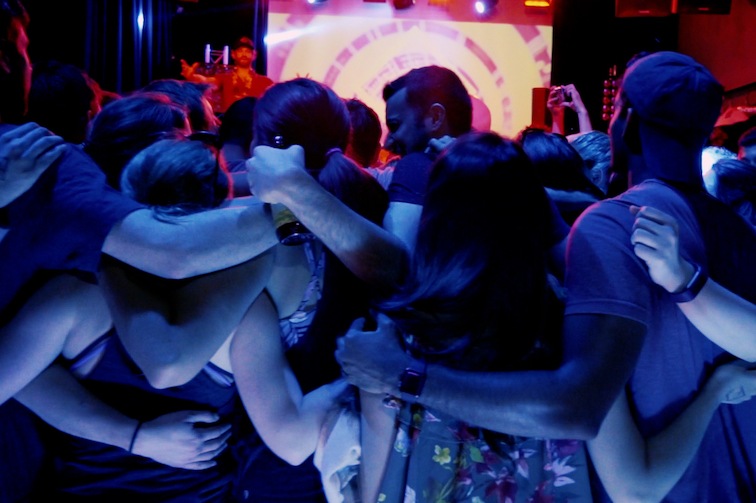“We basically want to eradicate the Solo cup,” says Radha Agarwal, who promotes substance-free club scenes in cities like New York, Miami, and Hong Kong through her company Daybreaker. (It's basically like being at a rave without alcohol, and wearing sneakers instead of heels.) Her latest mission? To introduce the dry dance party to campuses across the country.
"We basically want to eradicate the Solo cup."
“Our goal is to bring such epic performances, DJs, and experiences to the kids that they have so much more fun at Daybreaker than they do at some sort of drunken frat party,” Agarwal explains.
Sober socializing is seriously trending—but up until now, the loudest voices saying no way to rosé have been coming from those closer to their 10-year college reunion than freshman orientation.
Are 20-year-olds ready to give up the jungle juice and give sober partying a dry run?

Some sobering statistics
Agarwal was inspired to start a university chapter of Daybreaker after her partner’s college-aged brother lost two friends to suicides involving drugs. She started doing some research into substance-abuse issues on campuses and was shocked by the statistics she found.

{{post.sponsorText}}
According to the National Institute of Alcohol Abuse and Alcoholism, 60 percent of university students drink alcohol each month, and 2 out of 3 of them engage in binge drinking. Its research also estimates that 1,825 die from booze-related injuries each year, and 97,000 experience sexual assault or date rape while under the influence.
"In college, the concept of sober feels like 'ugh, lame.' Our goal is to have sober mean connected, present, vibrant, and here in your own skin."
“In college, the concept of sober feels like, ‘Ugh, lame,'” says Agarwal. “Our goal is to turn the word on its head and redefine what it means; have sober mean connected, present, vibrant and here in your own skin."
After realizing that the Daybreaker community already had 8,000 members with .edu email addresses, the idea for Daybreaker Campus was born. The first event took place at the University of Southern California’s “Springfest" on April 1, and kicked off with morning yoga followed by a party complete with a DJ, MCs, dance troupes, and community leaders. A second gathering happened at the Wharton School of the University of Pennsylvania on April 18, and New York University experienced its first dry rave on May 5. (Interested students at 35 different colleges across the country can sign up for updates—or even apply to be a community ambassador and organize ones themselves.)
“I’ve had multiple people tell me it was one of their most memorable events of the spring,” says Sara Munford, a 27-year-old MBA student who helped bring Daybreaker to Wharton’s West Philadelphia campus. “In a way, it was more fun [than a typical party] because you know everyone’s there and dancing out of their own joy, and you know everyone’s fully present.”

Proving the party doesn't end when the kegs stop flowing
Daybreaker is the latest party to hit the sober social scene, but isn’t alone in its mission. Phi Slam started throwing “alcohol-free raves” at the University of Georgia in 2005, Gravity House hosted its first Solo cup-free party at Gordon College in the fall of 2016, and the Collegiate Recovery Program (which started in 2012 at the University of Michigan) now has 135 chapters hosting dry events at schools across the country.
Around the same time that the CRP was founded, Jake White launched Party.0 during his junior year at the University of Wisconsin–Oshkosh, after feeling “weird” and “alone” because he didn’t want to drink at parties. The organization helps students at schools across the country plan their own substance-free events, all of which are promoted via word of mouth.
"A lot of people know that people are being date raped at these drinking parties and making decisions that change the rest of their lives."
“I was shocked at how [many] people want something like this. I thought [students] would be skeptical and say it's dumb because drinking is such a cultural norm,” says White. “But a lot of [them] know that people are being date raped at these parties and making decisions that change the rest of their lives. They’ve seen addiction in their families, so I think that’s also making people a lot more receptive to something new or different.”
Whether keg stands have officially been replaced by handstands remains to be seen, but one things certain: There may be a whole lot more green juice-filled Solo cups at graduation parties this spring.
If you want to throw an alcohol-free fête in your own dorm room (or living room), here are the mocktail and kombucha drink recipes to make it happen.
Loading More Posts...